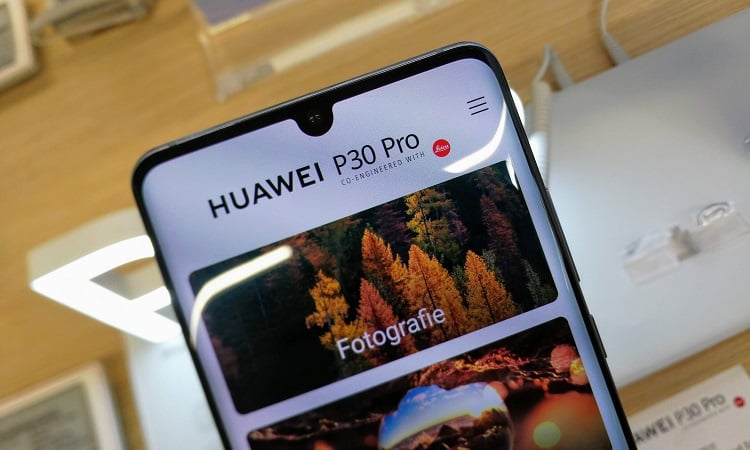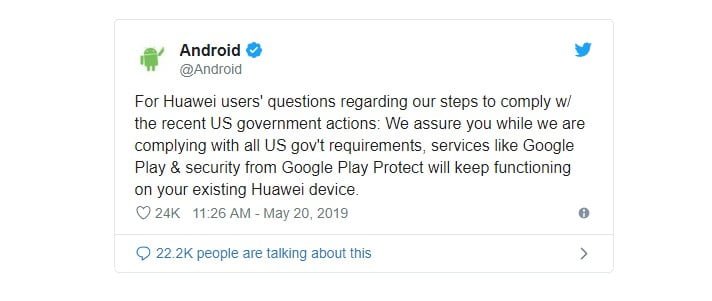US president Donald Trump has recently signed an executive order banning the use of equipment made by companies that are considered a threat to national security. Following that, news emerged that Google has dropped Huawei from the Android Licensing program. This means that with immediate effect, no future smartphones from this manufacture will be released with Google Mobile Services such as the Google Play Store and Gmail App.
Although the order did not specify China or Huawei, the US Commerce Department did and Huawei along with many of its subsidiaries were added to the equivalent of a ‘ban list’. This means that no US companies can do business with any of those companies without express permission form the US government.
Google, as a tech company had to cease business with Huawei and its subsidiaries due to that order. The lettering that demands this is that it cannot do business with Huawei that “requires the transfer of hardware and software products” – of which its Mobile Services are a part.
What the US has Claimed Against Huawei
- US authorities claim that Huawei is breaking trade sanctions and committing bank fraud. Ironically, it obtained this information by spying on Huawei.
- The CIA claims Huawei is funded by the Chinese military and intelligence arms. Unfortunately, they aren’t willing (or perhaps, able) to back this claim up with any substantial proof.
- The US has consistently claimed that Huawei’s equipment is “pervasively unsafe” – but has refused to allow Huawei to prove anything to the contrary. In Fact, the US has even refused to consider risk mitigation agreements and has opted for an outright ban (despite it agreeing to risk mitigation with Nokia and Ericsson)
We are pretty sure that there are other accusations floating around, but these are the most outstanding so far. Since 2012, the US has claimed that Huawei has been a National Security Threat, but to date has produced no evidence of this at all.
What is the Actual Problem?
Big Business and Donald Trump. The US has had a long history of lobbyists affecting the way the government does business and with the personal prejudices of Donald “Make America Great Again” Trump it gets worse.
In what he thinks is an effort to bring jobs back to the US, Trump’s administration has levied crippling taxes against China to the tune of over $250 billion dollars – and threatens more. This of course has resulted in return salvos from China.
The result – consumers paying higher prices at the cash register.
Unfortunately, this doesn’t seem to have done much so far so the US has decided to go after some of China’s biggest companies, starting with Huawei. Essentially, Huawei has become ‘Plan B’ in the US-China spat.
Who is the Loser Here?
Despite the headlines reading Huawei all around the world, to know the actual losers we must dig much deeper and get closer to the ground. Doubtless there will be ramifications for them both financially as well as well as operationally. It could mean the jobs of thousands of workers for the Chinese giant.
Yet what will also be at stake are the jobs that thousands of Americans hold as part of the ecosystem of companies are associated with Huawei in some form or other. Huawei isn’t an island and it not just sells to, but also buys from the US.
Each year, the CHinese manufacturer purchases more than $11 billion in products from US companies, meaning that this move against Huawei will affect all of that. If you’re talking about technology, Huawei is also the leader in 5G infrastructure, which the US and allies will also be losing out on.
Finally, there are the millions of US consumers who will be missing out on the opportunity to own affordable smartphones. An Apple iPhone XS costs around $999 and the company doesn’t make ‘budget’ models. On the other hand, the Honor View 20 starts at less than $450 – and that is expensive for their price range.
What Happens to Existing Huawei Product Users
The company says that for now it will continue with its updates and product roll-outs as planned. This include the pending launch of the Honor 20 which is due in less than 24 hours.
Huawei has made substantial contributions to the development and growth of Android around the world. As one of Android’s key global partners, we have worked closely with their open-source platform to develop an ecosystem that has benefitted both users and the industry.
Huawei will continue to provide security updates and after-sales services to all existing Huawei and Honor smartphone and tablet products, covering those that have been sold and that are still in stock globally.
Google on the other hand has said that it will allow existing Huawei devices to continue with access to apps as usual;



